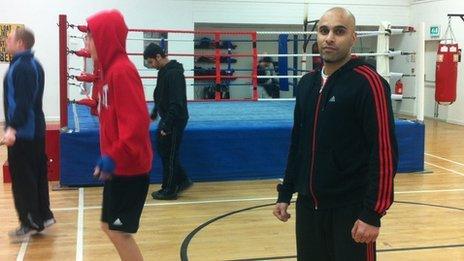PCC elections: Candidates withdrawing over minor crimes 'wrong'
- Published

Baz said it was important for people to be given a second chance and help them break away from crime
Several candidates for the role of police and crime commissioner have been forced to stand down over a minor offence committed during their formative years.
But is this the right message to be sending to young people trying to break away from crime?
Former Nottingham gang member Marcellus Baz does not think so. He argues "once someone has a conviction it becomes a vicious circle, they end up returning to crime because no-one will give them a chance".
The former boxer, whose career was ended after a cleaver attack, now runs the KK Gym, where he uses sport to build self-worth and break down barriers between rival gangs.
"I think it's important to be given a second chance, otherwise I wouldn't be here right now helping young people," he said.
"Boxing saved me from jail, or worse, and taught me discipline and to respect others. It helped me channel my energy in a positive way and helped me control my aggression.
"It also gave me self-esteem and helped me to get work."
'Wrong turn'

Baz said PCCs needed to support organisations which help people to keep out of trouble
Baz, as he is known, said: "I now use my past experiences to help relate [to] and understand young people in similar situations and think candidates with spent records should be allowed to stand."
In Nottinghamshire, Conservative candidate Mike Quigley pulled out over a minor offence committed 44 years ago and in Avon and Somerset, Labour's Bob Ashford said a crime committed when he was 13 had blocked him from the candidacy.
Labour's Phil Dilks, who stood down in Lincolnshire, said he was "deeply disappointed at not being able to stand" over an incident involving a stolen crash helmet in 1968.
Mr Dilks, who became known as "Fair Deal Phil" after he campaigned for reduced bus fares for pensioners and disabled people in the Deepings, said: "As an adult, I've always believed in public service and worked to uphold the law as fair and just.
"But I trust those who know me will judge me on my work over a lifetime rather than what resulted in a £5 fine in the 1960s."
In Northamptonshire, candidate Lee Barron was suspended by the Labour Party after it emerged he had a criminal conviction from 22 years ago.
In a statement on his Facebook page, Mr Barron said he had asked Labour to withdraw its endorsement of his candidacy and suspend his campaign.
He said: "We must not let this badly-pieced-together, ill-thought-out legislation take away from the wider campaign any longer."
Baz said: "Some of these PCC candidates may well have been the best equipped for the job.
'Right path'
He said: "It's all about having positive role models to look up to and try to follow. Anyone can take a wrong turn and make a mistake.
"But life is about getting back to the right path."
The withdrawal of these and a number of other candidates has prompted calls for a rethink.
Simon Duckworth, chair of the Association of Police and Crime Commissioners Transition Board (APCC), which is overseeing the move from police authorities to commissioners, said there were "anomalies" in the rules and has called for changes to be made.
But ministers said high standards were needed for elected officials and existing legislation cannot be changed in time for this year's elections.
The Home Office said the legislation disqualifies people from standing if convicted of an imprisonable offence, whether or not they themselves were sent to prison for that offence.
"This high standard was set with cross-party agreement because PCCs will hold police forces, whose duty is to uphold the law, to account," a spokesman said.
The first elections for PCCs will take place in 41 regions in England and Wales on 15 November. The commissioners will replace police authorities, with the power to determine budgets and hire and fire chief constables.
- Published2 November 2012
- Published14 September 2012
- Published10 August 2012
- Published2 July 2012